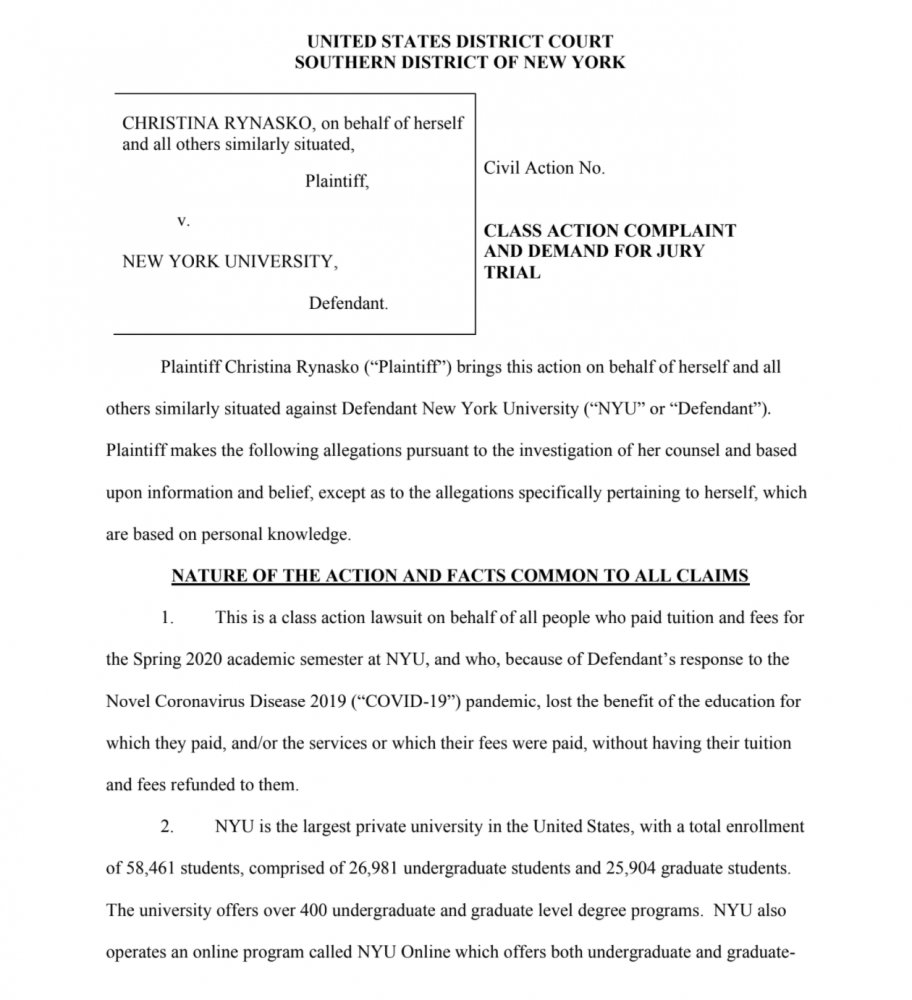A Tisch School of the Arts parent has filed a lawsuit against NYU claiming the school has not maintained the quality of education which students paid for at the start of the semester, according to case documents.
The suit is seeking class action status, which are cases filed against corporations by an individual or group seeking to represent a larger body of people who have suffered a financial loss because of the corporation. In this case Christina Rynasko, the parent of a musical theater major in Tisch, is filing a $5 million suit for tuition refunds for herself and all other families who paid for the spring semester, as first reported by Patch.
“Students have been deprived of the opportunity for collaborative learning and in-person dialogue, feedback, and critique,” the lawsuit reads. “The remote learning options are in no way the equivalent of the in-person education that Plaintiff and the putative class members contracted and paid for.”

Tuition for a Tisch student taking between 12 and 18 credits costs $29,276, including fees. Rynasko’s case comes days after similar suits were filed against Columbia University, Pace University and Long Island University.
Case documents argue that students are entitled to a refund for all in-person services which can no longer be provided by the university. The document highlights NYU’s marketing about the benefits of university life in New York City, even including screen grabs from the university website.
University Spokesperson John Beckman negated the validity of the suit.
“The University believes the suit is unwarranted and ill-advised,” Beckman told WSN in a statement. “The reality is that in the face of an unprecedented, world-altering pandemic, NYU has continued to fulfill its mission and meet its responsibility to ensure the educational progress of its students. Faculty continue to teach, and continue to be fully paid; students continue to have class with their faculty; student work is evaluated; academic credit is appropriately awarded; and students will graduate.”
The university has settled lawsuits before. In 2005, the university paid $500,000 to settle a medical malpractice suit against NYU Medical Center and in 2011, paid $210,000 to settle a harassment suit which stated that a Ghanian-born employee was subjected to racist verbal harassment by their supervisor. However, neither of these cases were class action.
Rynasko is not the only person who has a lawsuit on their mind. Several founders of the Tisch Partial Refund Effort have also been exploring filing a class-action suit. They turned to legal action as a last resort after receiving no response from administration after repeatedly sending both individual and group emails, Tisch senior and founding member of the effort Emma Hoersdig said.
“When we started this we felt the only leverage we had against NYU — for lack of a better word — was reputation,” Hoersdig said. “We feel we didn’t have financial power because they already had the money, and we didn’t yet know we had legal power and we thought, ‘If we talk to enough people about this and enough people agree, maybe they’ll try to save face and fix this and save face,’ and that didn’t work, regardless of how bad they look in the media right now.”
Marshall McGuire is a Tisch sophomore who agrees that university communications have so far not instilled confidence when it comes to acknowledging the financial struggles of students.
“I feel like when they have tried to be transparent, they come off in a way that’s very tone-deaf in a lot of instances,” McGuire said. “It doesn’t really take into account the diverse student body that we have. And the fact that some people can’t suffer financially the way they are suffering in regards to this pandemic, and the fact that they won’t be getting really any of their money back for the semester that’s now remote.”
Hoersdig and several other Tisch Refund page admins met with a lawyer on Tuesday, April 27 to discuss legal options. Hoersdig relayed one piece of the lawyer’s advice from that meeting; for a class-action suit to be successful the plaintiff needs to demonstrate that each member of the body they are representing faced equal losses. This is more difficult to prove as the group the plaintiff is attempting to represent grows larger because the defendant — in this case NYU — could potentially argue that not every person suffered equally.
The news was disappointing for Hoersdig, who hoped to file on behalf of the entire NYU student body.
“The man we spoke with said we would be much more likely to have success if we narrowed it down to Tisch specifically or even certain majors within Tisch, which is not ideal for me or a lot of people within our Facebook group,” Hoersdig said. “That’s why we were holding off posting about it or talking about it because we were figuring out how to include as many people as possible.”
The lawyer Hoersdig spoke with also shared that the plaintiff of a suit needs to appropriately represent the class of people they are filing on behalf of. In the case of the Rynasko suit, Hoersdig — after speaking with the lawyer — does not believe that being the parent of a student is ideal. The plaintiffs in the suits filed against Columbia University, Pace University and Long Island University were all students.
“I have a lot of worries about the suit that’s been filed,” Hoersdig said. “I am excited about this, but I don’t have a ton of confidence that it will play out the way that everyone wants. I think we will end up pursuing another suit because NYU said their plan was to fight this one, and we want to establish something that NYU will have a lot more trouble fighting.”
However, McGuire feels students’ energies may be more productive if directed toward trying to ensure that NYU supports students moving forward, rather than trying to retroactively gain back tuition.
“I support [Rynasko] in her decision, but at the same time I feel like we’re at a point in the semester where I feel like refunds are kind of a lost cause,” McGuire said. “I feel like really what we should be trying to do at this point is trying to create a more thorough dialogue with the administration and have them understand that something like this shouldn’t happen anymore.”
Email Emily Mason at [email protected]


























































































































































